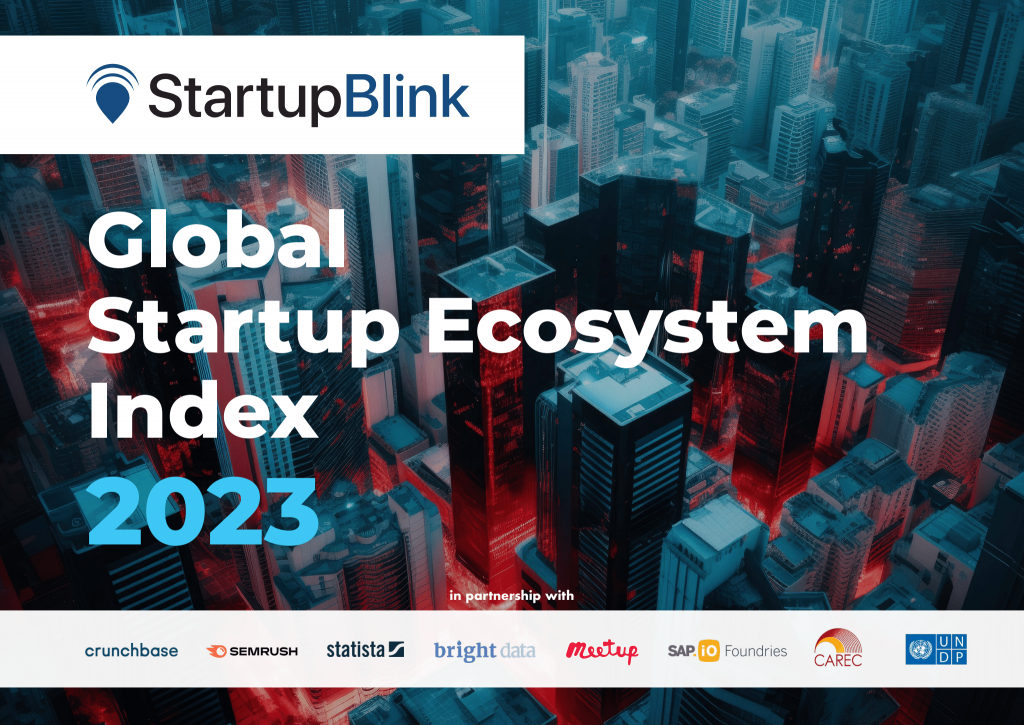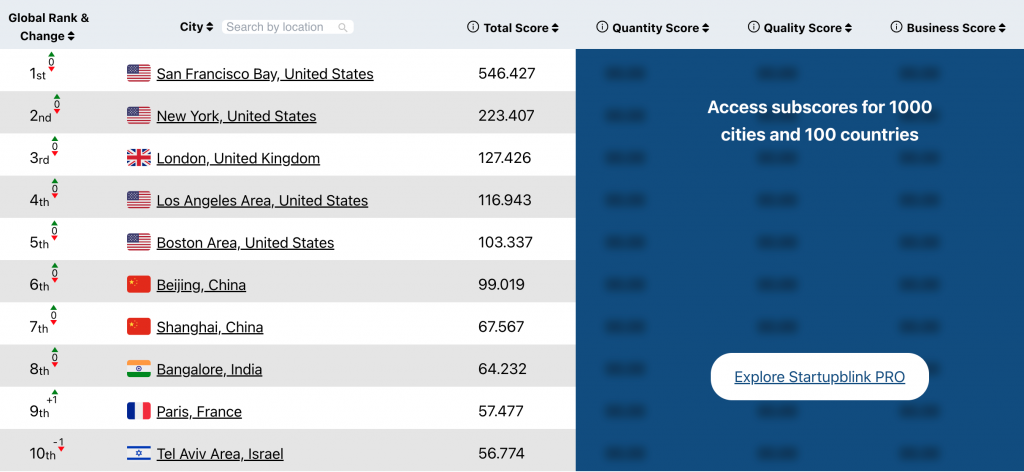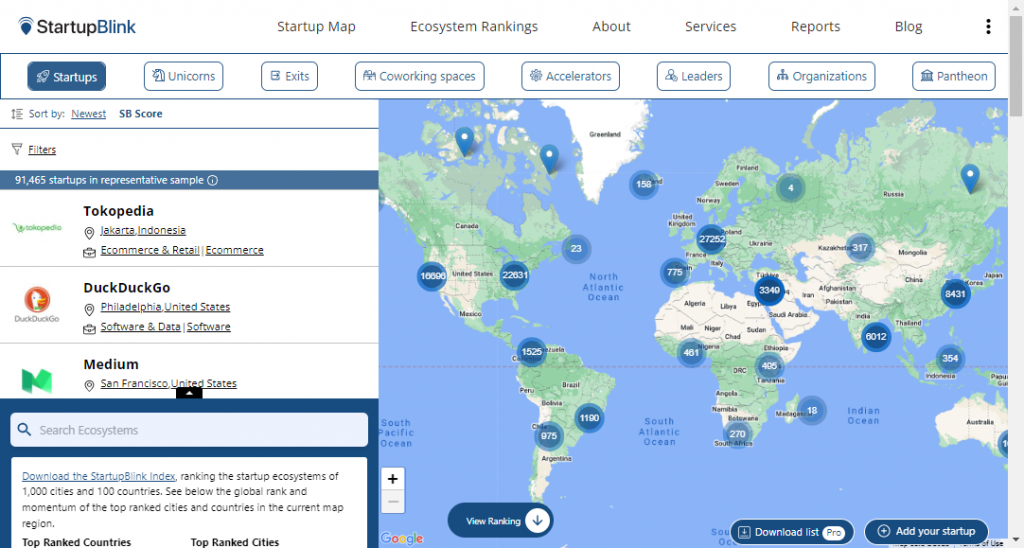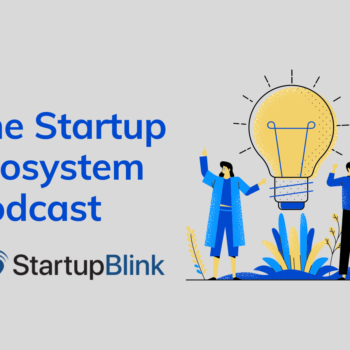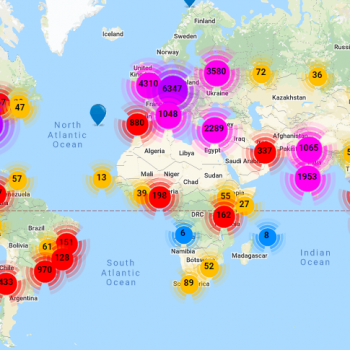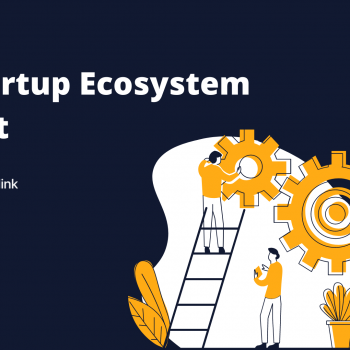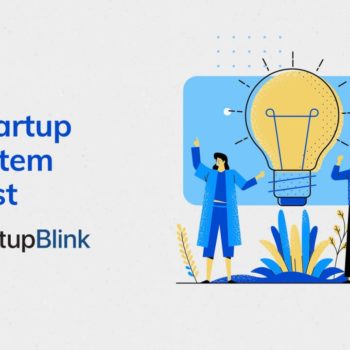Every year, StartupBlink releases the Global Startup Ecosystem Index report, providing research and rankings on startup ecosystems in 100 countries and 1,000 cities. The report empowers decision-making for relocation and policy-making. StartupBlink PRO further supports the decision-making process with the complete data on industries, regions, subregions, population and many more trends in the global startup ecosystem.
In the 37th episode of the Startup Ecosystem Podcast, Eli David and Martin Jordana delve into the latest Global Startup Ecosystem Index, discussing its highlights. Tune in to discover the microeconomic and macroeconomic trends in the Global Startup Ecosystem.
What is New in this Report?
In this latest report, there are some notable new additions that distinguish it from past reports. One significant difference is the inclusion of a new chapter dedicated to the current state of the global startup ecosystem. This chapter provides a comprehensive overview of the current ecosystem state, trends and its impact on startup ecosystems worldwide.
The Current State of the Global Startup Ecosystem Chapter examines the broader trends, including global economy update, industry trends, social trends and geopolitics updates. It delves into how these factors are influencing the startup ecosystem’s health and vitality.
By incorporating this new chapter, the report offers a more holistic perspective on the interconnectedness between the global trends and startup ecosystems. It highlights how macroeconomic factors can play a crucial role in shaping the opportunities and challenges faced by startups and entrepreneurs around the world.
A key takeaway from this chapter is that startups are facing significant challenges ahead. However, it’s important to note that building a startup is still possible, albeit with the need to adapt and change tactics. The current state calls for a more strategic and resilient approach, where entrepreneurs must be prepared to navigate the difficulties and pivot their strategies to meet the evolving market demands. While the road ahead may be tough, innovative and flexible startups can still find opportunities for growth and success by embracing change and making informed decisions.
Macroeconomic Trends on the Global Startup Ecosystem from the Report
1. Fluffy Companies will Disappear
In light of the rapidly changing economic situation and the dynamics of the startup ecosystem, there is a growing realization that fluffy companies, those lacking substantial business models and built on shaky foundations, are facing an uncertain future. The lack of sufficient capital and limitations in accessing funding and resources have exposed the vulnerabilities of these startups. As a result, only companies with strong and sustainable business models are expected to thrive and grow in this challenging environment.
This ongoing transformation signals a cleanup in the market, as weaker entities struggle to sustain their operations, while those with a solid foundation and value proposition gain a competitive edge. The collapse of inflated valuations of some startups is also a significant concern, as the market reevaluates their worth based on tangible performance and actual revenue generation.
Entrepreneurs and startup founders must now critically assess their business models, identify areas of weakness, and adapt their strategies to withstand the economic uncertainties ahead. Flexibility, resilience, and the ability to pivot will be essential traits for survival in this rapidly evolving ecosystem landscape. While the current situation presents challenges, it also presents opportunities for innovation and growth, enabling startups to emerge stronger and more resilient than ever.
2. Deglobalization becomes widespread

Geopolitical trends are increasingly shaping the global startup ecosystem, with deglobalization emerging as a significant factor. In particular, countries like China and Russia have been increasingly disconnecting from the rest of the world in various aspects, including trade and technology cooperation. These actions have far-reaching implications for the international business landscape and the startup ecosystems operating within it.
The deglobalization trend introduces complexities and uncertainties for startups that have relied on international markets, collaborations, and access to global resources. Cross-border activities, once taken for granted, may now face challenges in terms of regulatory compliance, market access, and trade barriers.
For startups and entrepreneurs seeking to expand their reach and establish a global presence, navigating through these geopolitical shifts becomes a critical consideration. Strategic planning and adaptability are crucial to identify new opportunities and mitigate potential risks arising from deglobalization.
However, it’s important to note that despite these challenges, localized opportunities may arise in the wake of deglobalization. Startups may find increased support and demand within their domestic markets as governments prioritize and invest in local businesses. Therefore, understanding the geopolitical trends and tailoring business strategies accordingly can enable startups to weather the changes and position themselves advantageously in this shifting environment.
3. Social Trends Impacting the Startup Ecosystems
Social trends are also exerting their influence on the startup ecosystem, reshaping how entrepreneurs and startups operate and collaborate. One notable trend is the rise of digital nomad visas and startup visas in various countries, offering new opportunities for remote and location-independent work.
Digital nomad visas allow professionals to live and work in different countries without the constraints of traditional work visas, enabling startups to access a diverse talent pool from around the world. Yet, the impact of digital nomad visas is unambiguous as nomads do not stay in an ecosystem for a long-term. Similarly, startup visas offer streamlined pathways for foreign entrepreneurs to launch and grow their startups in certain countries, fostering innovation and cross-cultural exchange.
Moreover, the acceleration of remote work as a mainstream practice has transformed how startups function, breaking down geographic barriers and enabling teams to collaborate seamlessly across borders. This trend has opened up new possibilities for talent acquisition, team building, and market expansion, enabling startups to tap into global expertise and resources.
As startups embrace these social trends, they must also consider the challenges that come with remote work and virtual collaboration. Effective communication, project management, and team cohesion become even more critical in a distributed work environment.
Microeconomic Trends on Startup Ecosystems from the Report
1. Regional Dominance and Diversity
The microeconomic analysis of the Global Startup Ecosystem Index report highlights interesting trends in regional dominance and diversity. North America continues to maintain its strong position, with the USA retaining its top spot as the number one country for startups. Latin America is emerging as a noteworthy player in the global startup ecosystem, signifying its increasing influence and potential for growth.
In Europe, the diversity of startup ecosystems is evident, with 409 out of 1000 cities represented in the rankings. Notably, Paris has shown remarkable progress, surpassing Tel Aviv for the first time, underlining the rise of the French startup ecosystem. Meanwhile, Asia is experiencing growth, whereas Africa’s progress has encountered some stagnation this year, suggesting opportunities for further support and development.
Australia’s efforts in establishing itself as a startup hub are ongoing, while China’s ranking has experienced a decrease, signaling potential challenges within the local ecosystem. On a positive note, Japan exhibits promising developments in its startup ecosystems.
2. Dynamics in the Top Ranked Cities
In North America, San Francisco remains a prominent tech hub. Its ranking gap with other cities was gradually narrowing each year, but this year is an exception. New York holds the second-place position, however, its potential to overtake San Francisco seems not feasible in the near future, as for the first time the gap between them has stayed almosts the same.
London secures the third spot and stands out for its interesting tech visas, attracting both refugees seeking refuge from EU regulations and founders considering relocation to escape certain EU regulatory challenges.
The report also touches on other cities in the top 10, signifying their significance in the global startup ecosystem.
These insights provide valuable information for policymakers, investors, and entrepreneurs, highlighting regional strengths and areas for improvement. As the global startup ecosystem continues to evolve, understanding these nuances is crucial for making informed decisions and fostering the growth of vibrant and competitive startup ecosystems around the world.
How did the report impact the ecosystem and entrepreneurs?
The Global Startup Ecosystem Index report has had a significant impact on startup ecosystems and entrepreneurs worldwide. By providing comprehensive rankings and insights, it empowers entrepreneurs to make informed decisions about their startup’s location, while also driving ecosystem development and encouraging global collaboration and investment.
Moreover, the interactive map has facilitated global mobility and enriched startup ecosystems through cross-border knowledge sharing. As a valuable tool for success, the report continues to play a pivotal role in informing the startup enthusiasts around the world.
About Us:
StartupBlink is the world’s most comprehensive startup ecosystem map and research center, working with over 100 government entities worldwide. StartupBlink’s global startup ecosystem map has tens of thousands of registered startups, coworking spaces, and accelerators, creating a robust sample of innovation globally.

